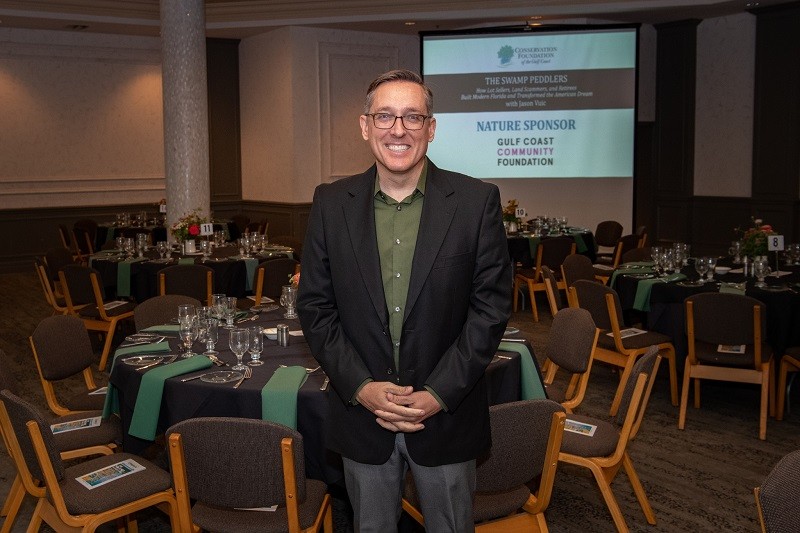Conservation Foundation Nature Lecture Sheds Light on Historic Florida Land Development
The Giving Coast
SRQ DAILY WEDNESDAY PHILANTHROPY EDITION
WEDNESDAY MAY 17, 2023 |
BY LAURA PAQUETTE
Author Jason Vuic spoke about his book, Swamp Peddlers, at the Nature Lecture hosted by the Conservation Foundation of the Gulf Coast. Photo by Seth Berman.
Last month, the Conservation Foundation of the Gulf Coast hosted a Nature Lecture at Michael’s On East, featuring author Jason Vuic, who spoke about his book, Swamp Peddlers, which tells the tale of the Florida installment land sales industry that thrived during the 1950s and 1960s. Raised in Punta Gorda, Vuic observed the strange pattern of empty lots along the inland areas of the Gulf Coast. “The most defining characteristic of southwest Florida growing up was our endless subdivided lots that were everywhere,” he said.
Curious about how this trend began, Vuic researched the Florida land sales industry. He learned that large Miami-based developers, known as land giants, had discovered an ingenious way to buy up and sell parcels of land with promises to turn them into communities for residents. “The lots were built before anyone wanted to live there. These communities were everywhere and built around the same time. The land giants were massive companies, but in 1954 they didn’t exist. By 1960, it was the only game in town, almost like Silicon Valley had appeared in Florida, but by selling lots to northerners. These companies sliced, diced and subdivided the state.”
In order to entice people to buy into this version of the Florida dream, the land giants targeted specific demographics, employing marketing techniques to appeal to their desires. These companies catered to middle-income northerners, most of whom were retirees with stable pensions. Former teachers, policemen and steel mill workers all wanted to experience the Florida lifestyle, made more attractive by innovations like air conditioning. “Up north, people were getting out of the cities in droves. Middle-income retirees did not live in the new suburbs because they didn’t have enough money. If you couldn’t go to the suburbs, you could move to Florida, if it were parceled out and sold to you in an easy way, like $10 down $10 a month in installments.” Such installment plans were advertised via national magazines, radio ads and even infomercials. Many companies also targeted former GIs, employing unscrupulous methods to convince them to buy land. Some sold lots to GIs while they were stationed in Vietnam.
Even though the land giants were selling massive quantities of lots, they didn’t plan to create a livable community for residents. “The companies weren’t planning for cities; they were just trying to sell lots,” adds Vuic. The most future residents got was a paved road because whenever a lot was sold the companies had to provide one. With no industry or infrastructure to support anyone living on this land, people abandoned the lots, which now lie empty, connected by what Vuic calls “roads to nowhere.” Because various individuals own these lots, initiatives to consolidate them and repurpose the land have been difficult.
However, Christine Johnson, president of the Conservation Foundation, stated that in spite of the challenges, the foundation is working to turn these areas back into wild places. The foundation hopes to close on one such property later this fall. “I hope you can draw the connection between this talk and our work. It’s important that we understand where we came from so we can learn from our past,” she said.
Learn more about the Conservation Foundation of the Gulf Coast at conservationfoundation.com.
Author Jason Vuic spoke about his book, Swamp Peddlers, at the Nature Lecture hosted by the Conservation Foundation of the Gulf Coast. Photo by Seth Berman.
« View The Wednesday May 17, 2023 SRQ Daily Edition
« Back To SRQ Daily Archive









